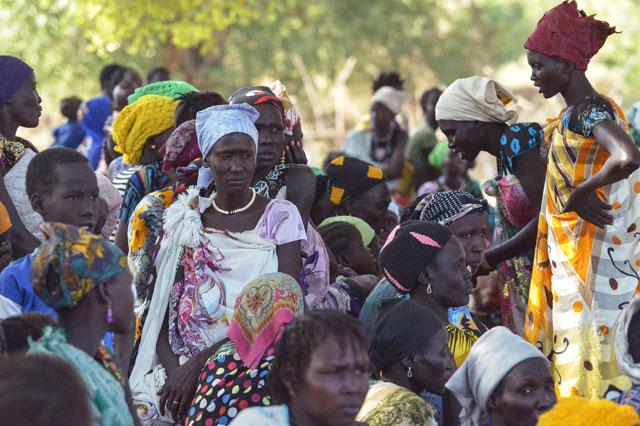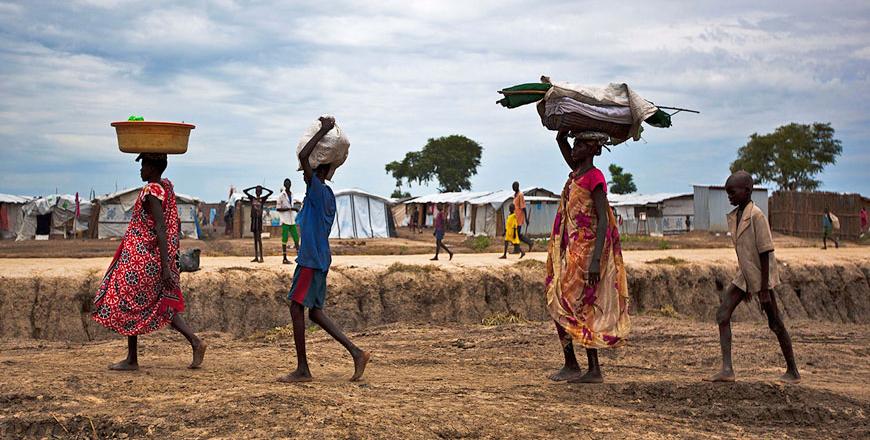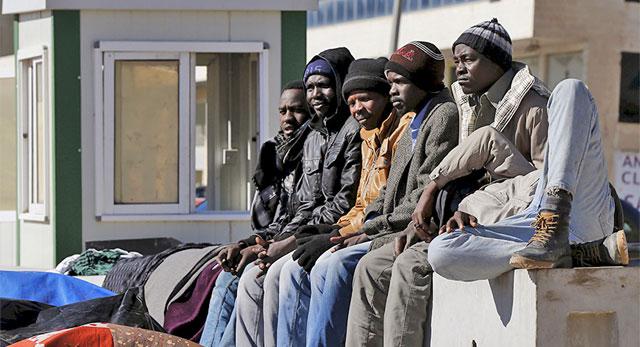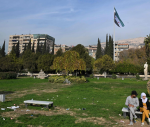You are here
Lack of hope in South Sudan camps drives youth into gang crime
By Thomson Reuters Foundation - Jun 07,2018 - Last updated at Jun 07,2018
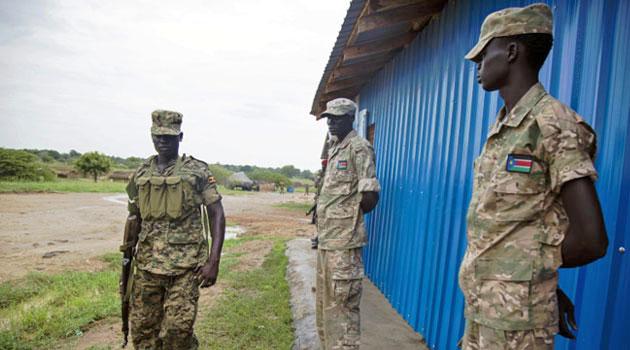
This file photo shows a military base at the international airport in Juba, South Sudan (AFP photo)
POC3 CAMP, Juba — Having twice escaped the clutches of South Sudanese rebels who forced him to fight with them, Puok Barar, a grinning 16-year-old in rubber flip-flops decorated with the word “Love”, has already confronted many of his worst fears.
But in the PoC3 camp for people uprooted by violence and conflict, encircled by a barbed-wire fence on the outskirts of the capital Juba, where Barar now lives, he is still afraid.
His kidnappers may be far away, but inside the muddy camp of ramshackle tents, youths his age prowl, attacking others.
“They arm themselves with machetes and knives,” Barar told the Thomson Reuters Foundation. He described rampant alcohol and drug use by young gangs with names like G-Unit and Westlife, who fight, steal and abuse others.
His friend Nyenhial James Lam, 16, said the gang culture also extends to teenage girls, who have formed their own groups and take drugs. “The girls fight like the boys,” she said.
Civil war erupted in South Sudan — the world’s youngest nation, created in 2011 when it gained independence from Sudan — after clashes in 2013 between troops loyal to President Salva Kiir and others supporting his former deputy Riek Machar.
The violence, including gang rapes and attacks on civilians, has forced a third of the country’s 12 million people to flee their homes. Tens of thousands sought safety as close as they could get to bases housing United Nations’ peacekeepers.
These “Protection of Civilians” (PoC) sites were intended as temporary refuges, said Rob Simpson, country director for aid agency ACTED who manages three such camps.
Yet, stalled peace negotiations, together with rampant state corruption and no let-up in fighting, mean many people still cannot go home — and young people are bearing the brunt.
The United Nations runs six civilian protection sites across the country, housing more than 200,000 people.
In the past five years, four of the camps have been attacked by armed mobs, resulting in more than 180 deaths, according to the London-based Overseas Development Institute.
Thomas Makur Ruop, head teacher at Barar’s school, is worried for the first generation that will come of age in South Sudan.
“They are addicted to alcohol, crime and all those things. One day, they are going to be robbers [and] they may take the power,” Ruop said, watching children selling dried fish, rolling rusty bicycle wheels and playing in muddy puddles.
“They may develop something different, like what there is in Nigeria — Boko Haram,” he said, referring to the extremist militant group active around Lake Chad.
Using tactics from suicide bombings to abductions and theft, most Boko Haram members are unemployed, frustrated youths from under-developed parts of Nigeria, Cameroon, Niger and Chad.
‘Crime centre’
ACTED’s Simpson said some children who were born in the PoC camp have never left its confines. “You’re living within a razor wire fence. It’s all you see,” he said.
Having escaped from the ranks of a rebel group that took him from his village, Barar is one of the luckier ones.
About 19,000 minors are still being used by armed forces and groups in South Sudan, according to the United Nations.
The UN children’s agency UNICEF has announced the release of more than 500 child soldiers from captivity since February, but recruitment of children by militias continues.
At the PoC sites, crime has dropped by close to a third in the past year due to interventions by peacekeepers and community police.
But gangs — mostly made up of young men aged between 15 and 20 — are still causing trouble, from vandalism and brawling to domestic violence, said Francesca Mold of the United Nations Mission in South Sudan.
A lack of opportunities stemming from entrenched poverty is a driving force behind the problem, she said.
The situation in the PoCs is worse in other parts of South Sudan, said ACTED’s Simpson. One camp in Bentiu in Unity State has a reputation as “the youth gang crime centre”, he added.
“In Juba, there’s a fear it could go the same way,” he said.
Aid shortages
International aid agencies are struggling to assist displaced people as they would in camps elsewhere, said Simpson.
For example, they cannot help people make a living from keeping animals, as livestock is banned in the PoCs due to lack of space, and there are few safe areas outside, he said.
Business training schemes are limited in what they can achieve, as the only clients are residents of the camps.
“You’re not going to have a regular demand or supply chain for your spare parts and tools,” Simpson said.
Lack of funding and basic necessities are another problem, because South Sudan is becoming “a forgotten crisis”, said Simpson, who previously worked with Syrian refugees in Jordan.
In Jordan’s Zaatari camp, for example, refugees get about 35 litres of water each per day, but in Juba’s PoC camps, the allowance is roughly half that, he said.
Aid agencies are turning to prisons and initiatives that tackle street-gang culture in inner-cities for ideas to help young people, he added.
Out of school
Barar sees going to school as his best bet for the future.
“Those who have studied well... are not recruited [by armed groups] because they are working,” he said.
Today 2 million South Sudanese children are out of school and more than 70 per cent of the population are illiterate, according to the United Nations and Human Rights Watch.
PoC3 has three schools run by foreign aid agencies, including the one Ruop heads. But they suffer from a shortage of materials, including secondary-level books, noted the teacher.
The government is unwilling to help and widespread corruption prolongs the suffering, Ruop said, urging the international community to step up efforts to bring peace.
“South Sudan is a very rich country — we have oil resources, we have agriculture, we have brains,” he said. “We cannot be like this.”
Related Articles
UDIER, South Sudan — Chol Deng, her husband and five children sit, exhausted, under a tree, having journeyed back to South Sudan&n
JUBA — They came for a night fleeing fighting, hammering on the gates of the United Nations base as gunmen rampaged through South Sudan's ca
AMMAN — Due to the large influx of Syrian refugees, Iraqis and persons of concerns (POCs) from Sudan, Yemen and Somalia and other countries


